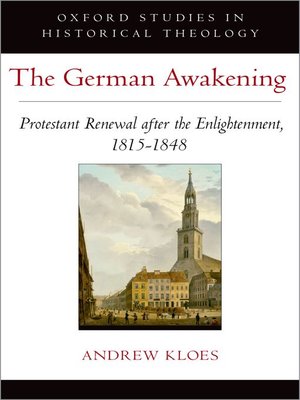The German Awakening
ebook ∣ Protestant Renewal after the Enlightenment, 1815-1848 · Oxford Studies in Historical Theology
By Andrew Kloes

Sign up to save your library
With an OverDrive account, you can save your favorite libraries for at-a-glance information about availability. Find out more about OverDrive accounts.
Find this title in Libby, the library reading app by OverDrive.



Search for a digital library with this title
Title found at these libraries:
| Loading... |
Historians of modern German culture and church history refer to "the Awakening movement" (die Erweckungsbewegung) to describe a period in the history of German Protestantism between the end of the Napoleonic Wars in 1815 and the Revolution of 1848. "The Awakening" was the last major nationwide Protestant reform and revival movement to occur in Germany. This book analyzes numerous primary sources from the era of the Awakening and synthesizes the current state of German scholarship for an English-speaking audience. It examines the Awakening as a product of the larger social changes that were re-shaping German society during the early decades of the nineteenth century. Theologically, Awakened Protestants were traditionalists. They affirmed religious doctrines that orthodox Protestants had professed since the confessional statements of the Reformation-era. Awakened Protestants rejected the changes that Enlightenment thought had introduced into Protestant theology and preaching since the mid-eighteenth century. However, Awakened Protestants were also themselves distinctly modern. Their efforts to spread their religious beliefs were successful because of the new political freedoms and economic opportunities that the Enlightenment had introduced. These social conditions gave German Protestants new means and abilities to pursue their religious goals. Awakened Protestants were leaders in the German churches and in the universities. They used their influence to found many voluntary organizations for evangelism, in Germany and abroad. They also established many institutions to ameliorate the living conditions of those in poverty. Adapting Protestantism to modern society in these ways was the most original and innovative aspect of the Awakening movement.






